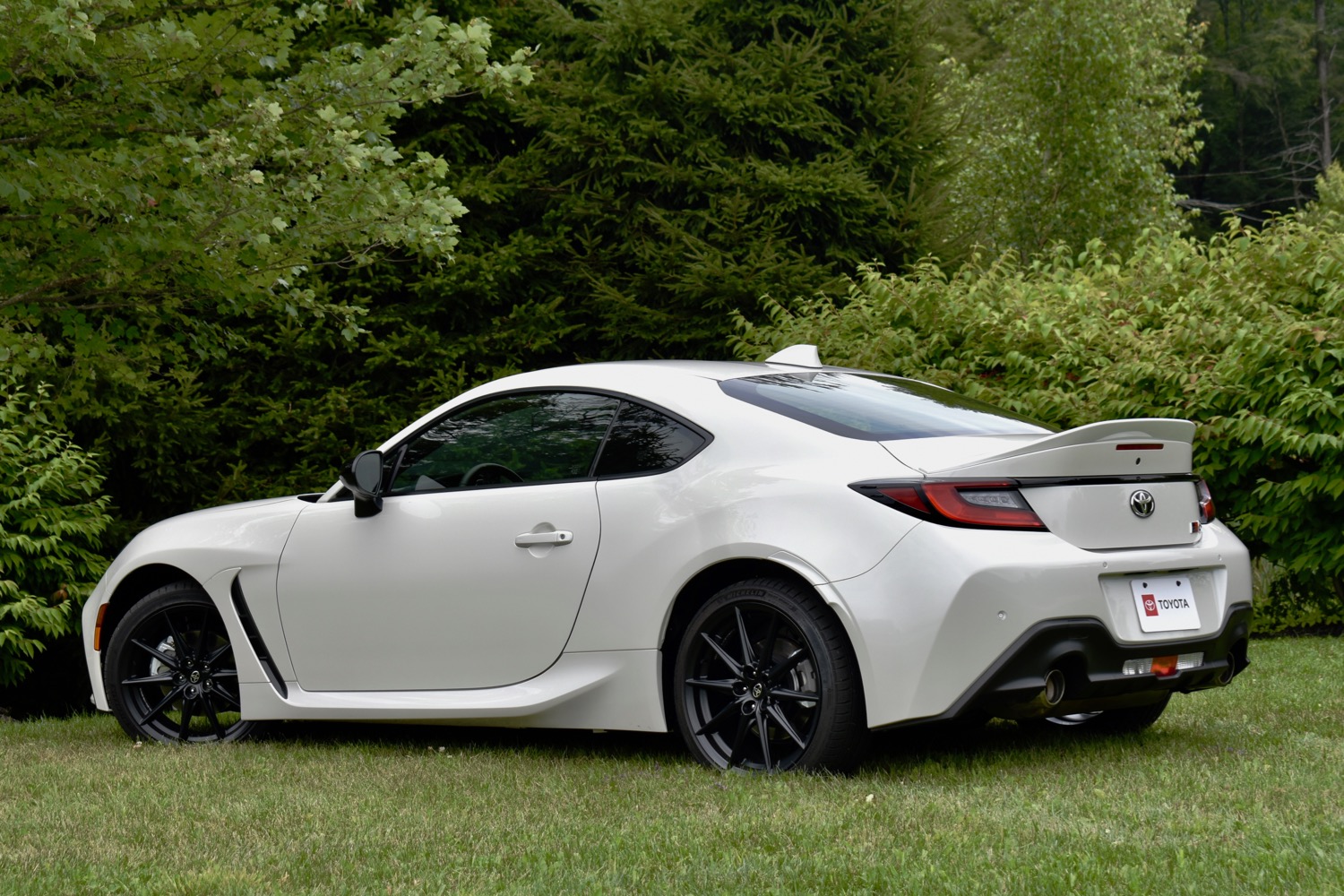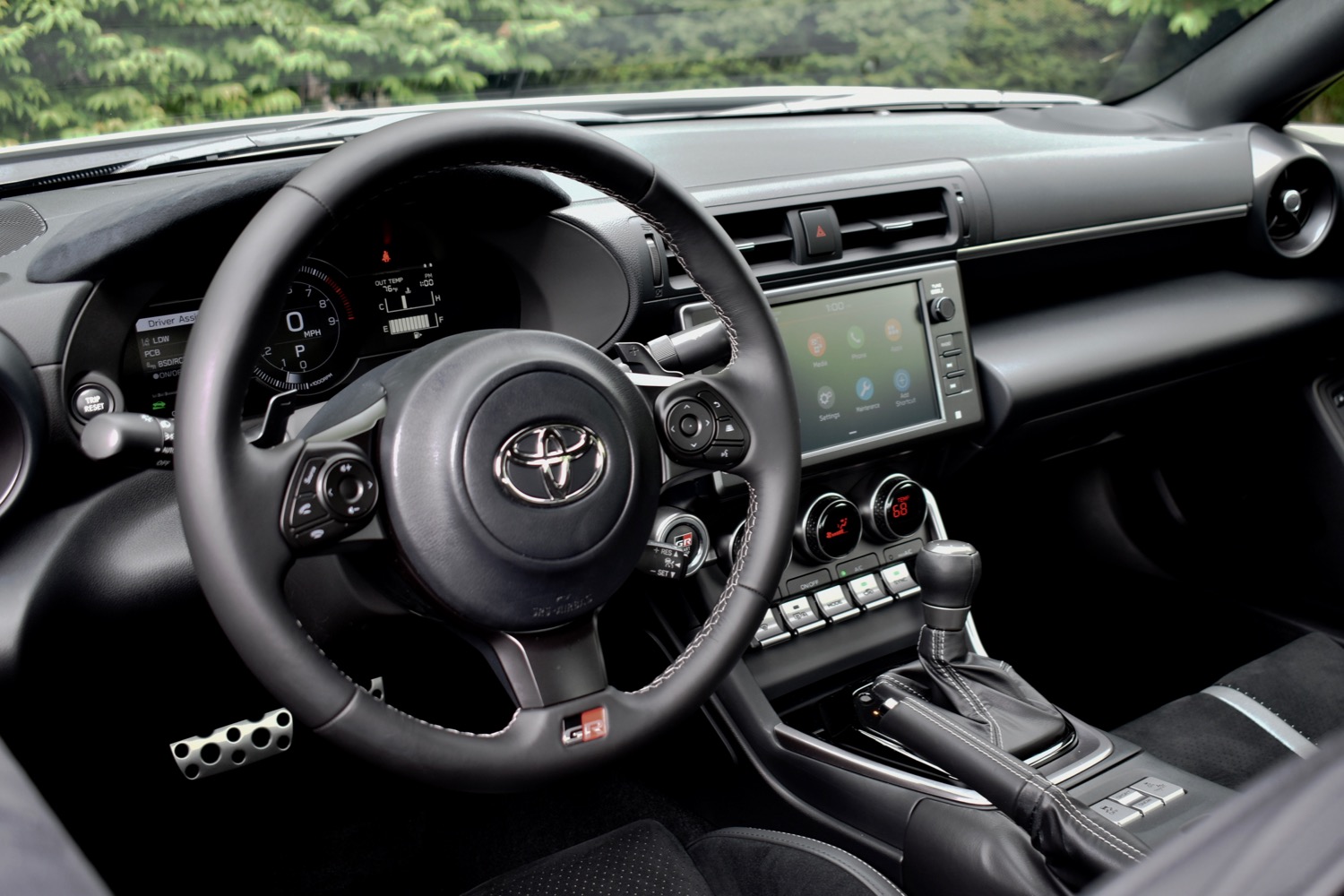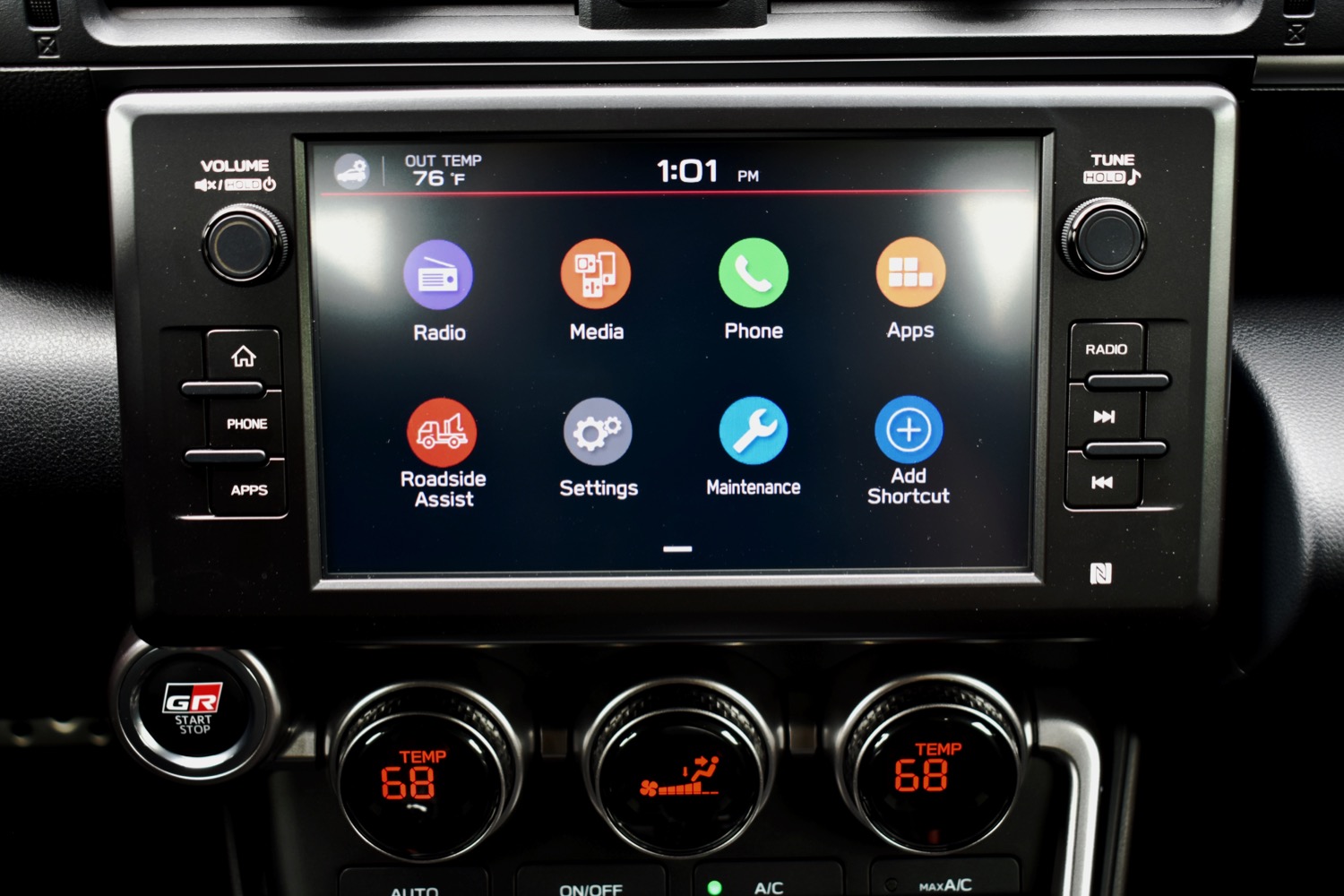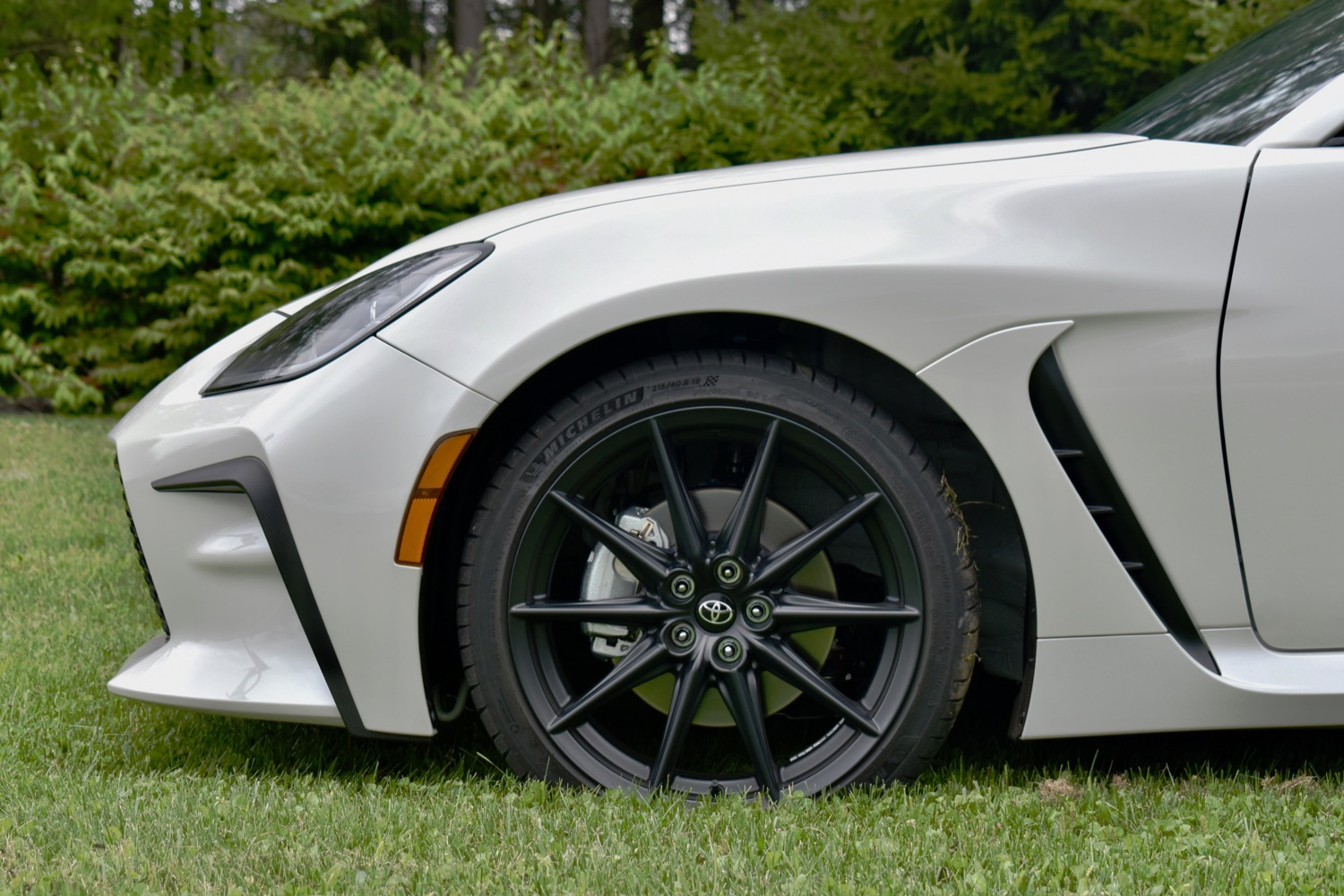Automakers love to use words like “sport” or “performance” to describe their latest wares, but usually, those descriptors are applied to sedans and SUVs that prioritize other things besides the driving experience. The 2022 Toyota GR 86 is different.
The GR 86 is a small, rear-wheel drive sports car designed to make driving as fun as possible. Such cars are rare these days. Only the Mazda MX-5 Miata and the GR 86’s twin, the Subaru BRZ, stand as true rivals. You’ll likely be able to get a Ford Mustang or Chevrolet Camaro for similar money, but they’re larger cars with a different character.
As part of a redesign for the 2022 model year, the car formerly known as the Toyota 86 gets “GR” nomenclature to fit Toyota’s new performance branding scheme. GR is short for Gazoo Racing, the Toyota division that’s also responsible for the Supra, as well as the automaker’s international racing programs. Note that Gazoo Racing is separate from Toyota Racing Development (TRD), which applies its own branding to some models as well.
Toyota will sell the GR 86 in base and Premium trim levels, and we got to try both out during a day of driving at New York’s Monticello Motor Club racetrack. Toyota hasn’t released pricing information yet but promises the base price will be under $30,000 (including destination), keeping the GR 86 on the affordable end of the spectrum.
Design and interior
As with its predecessor, the 2022 Toyota GR 86 is virtually identical to the Subaru BRZ, which also gets redesigned for the new model year. Toyota and Subaru partnered on the development of these sports cars because it made financial sense, as it allowed the two companies to share development costs for these low-volume vehicles. Toyota did the same thing with the Supra, which was twinned with the BMW Z4.
“86” references the 1986 AE86-generation Toyota Corolla, an enthusiast favorite that was immortalized in the manga and anime “Initial D.” However, while the AE86 was a more tuner-friendly version of an ordinary compact car, the GR 86 is a pure sports car. Toyota felt it was appropriate to use the “86” name because both cars are rear-wheel drive and because the name carries some weight with Millennial car buyers as well as the tuner crowd.
Styling is usually a sports-car selling point, but we don’t expect that to be the case here.
Styling is usually a sports-car selling point, but we don’t expect that to be the case here. The old Toyota 86 wasn’t a pretty car, and with the GR 86, Toyota seems to have just awkwardly piled more widgets onto that generic shape. The vents in the front fascia and fenders are functional but look tacked on. The headlights and taillights are new but aren’t distinctive. Toyota seems to be betting that people will buy the GR 86 based on how it drives, not how it looks.
As before, the interior is plain but functional. While the GR 86 has rear seats, they don’t have enough room for full-size adults. It’s better to think of them as extra cargo space. They also fold down, creating enough space to accommodate a set of tires for track days, Toyota claims. If interior space is a priority, the larger Ford Mustang or Chevrolet Camaro might be a better idea.
Tech, infotainment, and driver-assist
The Toyota 86 didn’t have much to offer in terms of tech, but that changes with the 2022 GR 86. The new model gets a standard 8.0-inch touchscreen and a 7.0-inch digital instrument cluster. That’s a big upgrade over the old 86, which only had a 7.0-inch touchscreen and analog gauges. Wired Apple CarPlay and Android Auto are standard as well.
While it’s a significant upgrade over the old infotainment system, the new version is still fairly basic. We found the touchscreen easy to use, but don’t expect any bells and whistles. The instrument cluster managed to pack a lot of information into a relatively small space. Switch to track mode, and you get a lap timer and a digital tachometer that’s easier to read at a glance than the traditional version.
The Toyota 86 didn’t have much to offer in terms of tech, but that changes with the 2022 GR 86.
The GR 86 also gets a decent array of driver-assist tech, but these features are only available on automatic-transmission cars. Opt for the automatic, and you get automatic emergency braking, adaptive cruise control, pre-collision throttle management, lane-departure warning, sway warning, automatic high beams, and lead-vehicle start alert, which sounds when the car in front pulls away from a stop. GR 86 Premium models also get blind-spot monitoring, rear cross-traffic alert, and adaptive headlights.
All of these features are enabled by Subaru’s EyeSight system, which uses a pair of cameras mounted near the top of the windshield. While the two cars share hardware, the GR 86 won’t get the rear automatic-braking and lane-keep assist functions that will be available on automatic-transmission 2022 Subaru BRZ models (as extra-cost options).
Driving experience
Like the 86, the GR 86 has a Subaru boxer engine under its low-slung hood. The boxer configuration — so named because the pistons cross paths like boxers throwing punches — provides a lower center of gravity, improving handling, Toyota claims.
For 2022, the four-cylinder engine grows from 2.0 liters to 2.4-liters and boasts more power. Output is now 228 horsepower and 184 pound-feet of torque, compared to 205 hp and 156 lb.-ft. before. Like its predecessor, the GR 86 is available with a six-speed manual or six-speed automatic transmission.
Toyota claims the new car is quicker, quoting zero to 60 mph in 6.1 seconds with the manual transmission and 6.6 seconds for the automatic. Those are improvements of 0.9 seconds for the manual and 1.4 seconds for the automatic, but these days, they don’t set the world on fire. However, the GR 86 isn’t about how quickly you get somewhere. It’s about how much fun you have on the way.
The GR 86 isn’t about how quickly you get somewhere. It’s about how much fun you have on the way.
The revamped engine combines with the things that made the old Toyota 86 great — including a low curb weight, rear-wheel drive, and an available manual transmission — to channel the essence of driving. Unlike so many modern cars, the GR 86 doesn’t isolate you from the action. Everything has an immediate impact, and the car gives plenty of feedback to let you know what’s going on. This is the driving equivalent of a fine wine. It’s something to be savored for its complexity.
The GR 86 is also a significant improvement over the old 86. That car had the same character, but the new one feels even sharper, with more precise steering and a tighter, more controllable chassis. Over back-to-back laps on the track, it was easier to place the GR 86 in corners than its predecessor. The GR 86’s more accessible torque also made it easier to power out of those corners. During a brief road drive, we also found the GR 86 to be quieter and more comfortable than its predecessor. It’s the one we’d choose for a long trip.
Gas mileage and safety
Official fuel-economy ratings haven’t been published yet, but Toyota estimates 21 mpg combined (19 mpg city, 26 mpg highway) with the manual transmission, and 24 mpg combined (20 mpg city, 30 mpg highway) with the automatic.
Crash-test ratings from the Insurance Institute for Highway Safety (IIHS) and National Highway Traffic Safety Administration (NHTSA) aren’t available either. That’s typical for newly-released vehicles, and sports cars also aren’t a priority for safety organizations because of their low sales volumes.
Toyota offers a three-year, 36,000-mile basic warranty and a five-year, 60,000-mile powertrain warranty. The GR 86 also gets a five-year corrosion warranty (with no mileage limit) and two years or 25,000 miles (whichever comes first) of scheduled maintenance and 24-hour roadside assistance. Buyers also get a free one-year membership in the National Auto Sport Association (NASA), so they can get the most out of their cars by attending track-day events.
How DT would configure this car
There isn’t a massive difference between the base GR 86 and the Premium model when it comes to tech, but the Premium does get blind-spot monitoring, rear cross-traffic alert, and adaptive front headlights, so that would be the better choice for buyers who want the most features.
Aside from tech, it’s worth considering what kind of driving experience you want. With its low-grip tires, the base GR 86 is a car for drifting enthusiasts who like to hang the tail out at every opportunity. The GR 86 Premium has gripper tires that make for a less dramatic experience but also likely quicker lap times. There’s no wrong answer here; it’s just a matter of preference.
Our take
Sports cars represent an ever-shrinking niche, but the 2022 Toyota GR 86 does have a few rivals, the closest being the Mazda MX-5 Miata. The Miata is the quintessential small sports car, and, like the GR 86, it emphasizes agility over power. The Mazda is more than a match for the Toyota in driving dynamics, but it’s only available as a convertible, making it even less practical.
GR 86 pricing should also come close to base versions of the Ford Mustang and Chevrolet Camaro. That means swapping the traditional V8 for a turbocharged four-cylinder engine but also gaining more interior space. Ford also offers a performance package for the four-cylinder Mustang that makes it pretty lively. However, these bigger cars still sacrifice some handling sharpness and driver involvement to the flyweight GR 86.
We haven’t driven the 2022 Subaru BRZ yet, but given its similarity to the GR 86 and our experiences with past versions of both cars, we don’t expect it to feel dramatically different from the Toyota. Subaru has confirmed that the 2022 BRZ will start at $28,955 (including destination), so there may not be much difference in price, either. Any purchase decision may come down to styling preference and which dealership makes a better offer.
Should you get one?
Yes. The Toyota 86 was a great sports car, but the GR 86 is even better.







